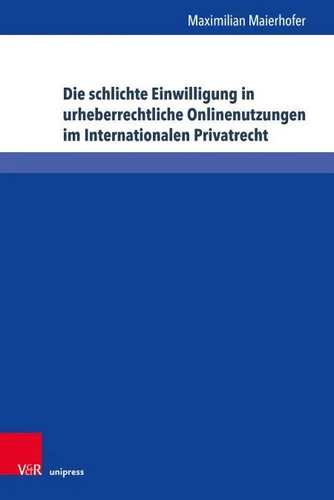Die schlichte Einwilligung in urheberrechtliche Onlinenutzungen im Internationalen Privatrecht
Par :Formats :
Disponible dans votre compte client Decitre ou Furet du Nord dès validation de votre commande. Le format PDF est :
- Compatible avec une lecture sur My Vivlio (smartphone, tablette, ordinateur)
- Compatible avec une lecture sur liseuses Vivlio
- Pour les liseuses autres que Vivlio, vous devez utiliser le logiciel Adobe Digital Edition. Non compatible avec la lecture sur les liseuses Kindle, Remarkable et Sony
 , qui est-ce ?
, qui est-ce ?Notre partenaire de plateforme de lecture numérique où vous retrouverez l'ensemble de vos ebooks gratuitement
Pour en savoir plus sur nos ebooks, consultez notre aide en ligne ici
- Nombre de pages271
- FormatPDF
- ISBN978-3-8470-1294-8
- EAN9783847012948
- Date de parution12/04/2021
- Protection num.pas de protection
- Taille2 Mo
- Infos supplémentairespdf
- ÉditeurV&R Unipress
Résumé
Die Nutzung von in das Internet geladenen Bildern durch kommerzielle Bildersuchmaschinen unterliegt dem Urheberrechtsschutz. In Ermangelung von urheberrechtlichen Schrankenregelungen wäre die Werknutzung rechtswidrig, wenn man nicht - mit dem BGH - eine schlichte Einwilligung des Urhebers annehmen würde. Maximilian Maierhofer beleuchtet den seit Jahren geführten Streit über die Existenzberechtigung der schlichten Einwilligung erstmalig aus der Perspektive des Internationalen Privatrechts.
Der Autor prüft, ob die vertragsnahe schlichte Einwilligung über das Schutzlandprinzip nach Art. 8 Rom II-VO oder das Vertragsstatut nach Art. 4 Rom I-VO (analog) zu behandeln ist. Letzteres könnte eine Rechtszersplitterung im Verletzungsprozess aus Sicht des Urhebers womöglich vermeiden. The use of images by search engines enjoys copyright protection. The utilization of the work would be illegal because of the absence of copyright limitation provisions, if one does not apply an so-called "implied license" declared by the author according to the jurisprudence of the German Federal Court.
Maximilian Maierhofer takes a closer look to this long-lasting dispute from the perspective of Conflict of Laws. He examines whether the contract-related "implied license" is covered either by the principle of country protection (Article 8 Rome II Regulation) or by the law applicable to the contract (Article 4 Rome I Regulation). From the author's point of view, the application of Rome I Regulation could help to avoid a fragmentation of law in an infringement litigation.
Der Autor prüft, ob die vertragsnahe schlichte Einwilligung über das Schutzlandprinzip nach Art. 8 Rom II-VO oder das Vertragsstatut nach Art. 4 Rom I-VO (analog) zu behandeln ist. Letzteres könnte eine Rechtszersplitterung im Verletzungsprozess aus Sicht des Urhebers womöglich vermeiden. The use of images by search engines enjoys copyright protection. The utilization of the work would be illegal because of the absence of copyright limitation provisions, if one does not apply an so-called "implied license" declared by the author according to the jurisprudence of the German Federal Court.
Maximilian Maierhofer takes a closer look to this long-lasting dispute from the perspective of Conflict of Laws. He examines whether the contract-related "implied license" is covered either by the principle of country protection (Article 8 Rome II Regulation) or by the law applicable to the contract (Article 4 Rome I Regulation). From the author's point of view, the application of Rome I Regulation could help to avoid a fragmentation of law in an infringement litigation.
Die Nutzung von in das Internet geladenen Bildern durch kommerzielle Bildersuchmaschinen unterliegt dem Urheberrechtsschutz. In Ermangelung von urheberrechtlichen Schrankenregelungen wäre die Werknutzung rechtswidrig, wenn man nicht - mit dem BGH - eine schlichte Einwilligung des Urhebers annehmen würde. Maximilian Maierhofer beleuchtet den seit Jahren geführten Streit über die Existenzberechtigung der schlichten Einwilligung erstmalig aus der Perspektive des Internationalen Privatrechts.
Der Autor prüft, ob die vertragsnahe schlichte Einwilligung über das Schutzlandprinzip nach Art. 8 Rom II-VO oder das Vertragsstatut nach Art. 4 Rom I-VO (analog) zu behandeln ist. Letzteres könnte eine Rechtszersplitterung im Verletzungsprozess aus Sicht des Urhebers womöglich vermeiden. The use of images by search engines enjoys copyright protection. The utilization of the work would be illegal because of the absence of copyright limitation provisions, if one does not apply an so-called "implied license" declared by the author according to the jurisprudence of the German Federal Court.
Maximilian Maierhofer takes a closer look to this long-lasting dispute from the perspective of Conflict of Laws. He examines whether the contract-related "implied license" is covered either by the principle of country protection (Article 8 Rome II Regulation) or by the law applicable to the contract (Article 4 Rome I Regulation). From the author's point of view, the application of Rome I Regulation could help to avoid a fragmentation of law in an infringement litigation.
Der Autor prüft, ob die vertragsnahe schlichte Einwilligung über das Schutzlandprinzip nach Art. 8 Rom II-VO oder das Vertragsstatut nach Art. 4 Rom I-VO (analog) zu behandeln ist. Letzteres könnte eine Rechtszersplitterung im Verletzungsprozess aus Sicht des Urhebers womöglich vermeiden. The use of images by search engines enjoys copyright protection. The utilization of the work would be illegal because of the absence of copyright limitation provisions, if one does not apply an so-called "implied license" declared by the author according to the jurisprudence of the German Federal Court.
Maximilian Maierhofer takes a closer look to this long-lasting dispute from the perspective of Conflict of Laws. He examines whether the contract-related "implied license" is covered either by the principle of country protection (Article 8 Rome II Regulation) or by the law applicable to the contract (Article 4 Rome I Regulation). From the author's point of view, the application of Rome I Regulation could help to avoid a fragmentation of law in an infringement litigation.



